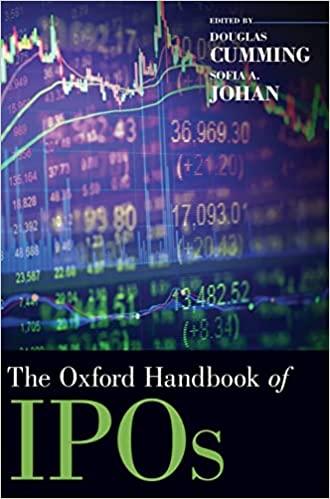
5. Question number 7 in Chapter 3 of MSPC. Don't look at the answer at the end of the book before having tried hard. Consider the following two-effort three-return scenario. Returns (a.k.a. outcomes) are given by 0,1,000 and 2,500 . Effort can be either e=0 (low effort) or e=3 (high effort). The following table summarises the link between effort and probability of returns The agent's payoff function is u(w,e)=we2 where w is the reward and e2 is the cost of effort e. The agent's reservation utility is given by u=21. The principal's payoff function is (x,w)=xw, where x is the return. (a) What are the optimal symmetric information (first best, no moral hazard) contracts? What effort will the principal demand from the agent? (b) What is the optimal contract under which the agent will induce an effort of e=0 if the only verifiable variable is the return x (second best, moral hazard)? Please go on to the next page... Iomework 2 (c) Given a moral hazard problem, what is the constrained maximisation problem that determines the optimal contract if the principal wants the agent to exert an effort of e=3 ? (hint: K-T conditions may be useful) (d) Which contract will the principal offer the agent under a moral hazard problem? (e) Discuss the optimal contract if the agent were risk neutral 5. Question number 7 in Chapter 3 of MSPC. Don't look at the answer at the end of the book before having tried hard. Consider the following two-effort three-return scenario. Returns (a.k.a. outcomes) are given by 0,1,000 and 2,500 . Effort can be either e=0 (low effort) or e=3 (high effort). The following table summarises the link between effort and probability of returns The agent's payoff function is u(w,e)=we2 where w is the reward and e2 is the cost of effort e. The agent's reservation utility is given by u=21. The principal's payoff function is (x,w)=xw, where x is the return. (a) What are the optimal symmetric information (first best, no moral hazard) contracts? What effort will the principal demand from the agent? (b) What is the optimal contract under which the agent will induce an effort of e=0 if the only verifiable variable is the return x (second best, moral hazard)? Please go on to the next page... Iomework 2 (c) Given a moral hazard problem, what is the constrained maximisation problem that determines the optimal contract if the principal wants the agent to exert an effort of e=3 ? (hint: K-T conditions may be useful) (d) Which contract will the principal offer the agent under a moral hazard problem? (e) Discuss the optimal contract if the agent were risk neutral







